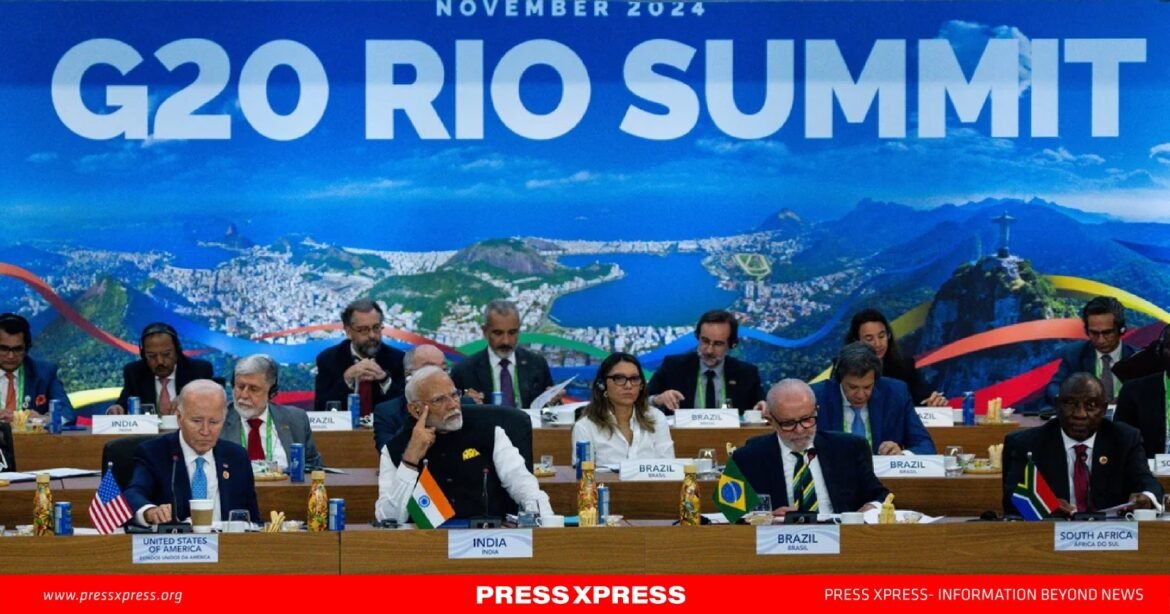G20 leaders meeting in Rio de Janeiro grappled with escalating global conflicts and pressing economic challenges, seeking to balance cooperation on climate and development with shifting geopolitical dynamics.
The leaders of the Group of 20 (G20) major economies gathered this week in Rio de Janeiro, facing a landscape shaped by pressing global crises and evolving geopolitical priorities. At the summit’s conclusion, a joint statement emphasized the need for collective action on urgent issues, including the humanitarian crises in Gaza and Ukraine, climate change, and global economic equity.
The two-day summit, held at Rio’s Modern Art Museum, reflected an international effort to strengthen multilateral cooperation. Against this backdrop, discussions carried a sense of anticipation, with leaders seeking to chart a course forward amid signals of potential shifts in U.S. policy under the incoming administration.
Global Conflicts Take Center Stage
The joint statement struck a somber note, spotlighting the “human suffering” in Ukraine and the “catastrophic humanitarian situation” in Gaza. Leaders urged immediate and comprehensive ceasefires and called for enhanced humanitarian aid and protection for civilians.
European representatives had pushed for more assertive language regarding the escalating Ukraine conflict, particularly after a significant Russian airstrike over the weekend. However, the final document reflected a carefully balanced tone, aimed at maintaining a semblance of consensus among member nations with differing priorities.
Russia’s absence loomed large, with Foreign Minister Sergey Lavrov representing Moscow in place of President Vladimir Putin. This lack of direct engagement underscored the complexities of addressing conflicts involving parties outside the G20 discussions.
Climate Action and Development Goals
Climate negotiations, always a contentious topic, featured prominently at the summit. Leaders recognized the urgency of resolving financial support mechanisms for developing nations to address climate challenges, with a goal of reaching an agreement at the upcoming COP29 summit in Azerbaijan. While the G20 statement reaffirmed the necessity of such a framework, specifics were left unresolved, underscoring the difficulty of translating ambition into action.
Brazil, as this year’s G20 host, expanded the summit’s focus beyond its traditional economic priorities. President Luiz Inácio Lula da Silva placed eradicating hunger and poverty at the forefront, launching a global alliance supported by over 80 nations, multilateral institutions, and philanthropic organizations. Lula’s impassioned appeal for systemic change resonated deeply, particularly as he framed poverty and food insecurity as failures of political decision-making rather than resource scarcity.
“Hunger and poverty are not the result of scarcity or natural phenomena,” Lula said. “They are the product of political decisions. In a world that produces almost six billion tons of food per year, this is unacceptable.”
Lula also championed discussions on fairer global tax policies, pushing for increased contributions from the world’s wealthiest individuals and corporations. While these priorities aligned with calls from developing nations, observers noted the potential for a shift in focus as the G20 baton passes to South Africa in 2025.

Geopolitical Realignments in Focus
The summit unfolded amid an evolving global order, with emerging economies increasingly asserting their influence. German Chancellor Olaf Scholz captured this sentiment, observing that “major changes in global structures” are driving a redistribution of power.
“These are countries that want to have their say,” Scholz noted, signaling growing momentum for developing nations to shape global priorities.
Chinese President Xi Jinping emerged as a central figure at the summit, announcing initiatives to support the “Global South.” From scientific collaborations with Brazil and African nations to lowering trade barriers for the least developed countries, Xi reinforced China’s commitment to strengthening ties with emerging economies. His visit to Brazil also highlighted the potential for deeper industrial partnerships, even as Brazil remains cautious about joining China’s Belt and Road Initiative.
Meanwhile, U.S. President Joe Biden’s presence reflected the transitional nature of American leadership, as his term nears its end. The incoming administration has hinted at significant shifts in trade, climate, and security policies, which could reshape the multilateral landscape. Leaders at the summit expressed hope that the foundations laid in Rio could withstand these potential shifts, emphasizing the importance of sustained dialogue and cooperation.
Balancing Continuity and Change
The Rio summit highlighted both the challenges and opportunities of multilateral diplomacy in an increasingly multipolar world. Brazil’s emphasis on hunger eradication and equitable development pushed the G20 beyond its traditional comfort zones, resonating with many member nations. At the same time, unresolved issues—such as climate finance and the response to global conflicts—underscored the difficulty of achieving broad consensus.
As the G20 prepares for a new chapter under South Africa’s leadership, the outcomes of the Rio summit serve as a reminder of the delicate balance required to navigate diverging national interests. With global challenges demanding collective action, the world’s largest economies face a pivotal moment: adapt to the changing geopolitical landscape or risk losing the cohesion needed to address the crises of our time.
While uncertainty remains, the summit’s discussions reaffirmed a shared recognition of these challenges and a determination to keep the lines of collaboration open, even as priorities and policies shift in the months ahead.


